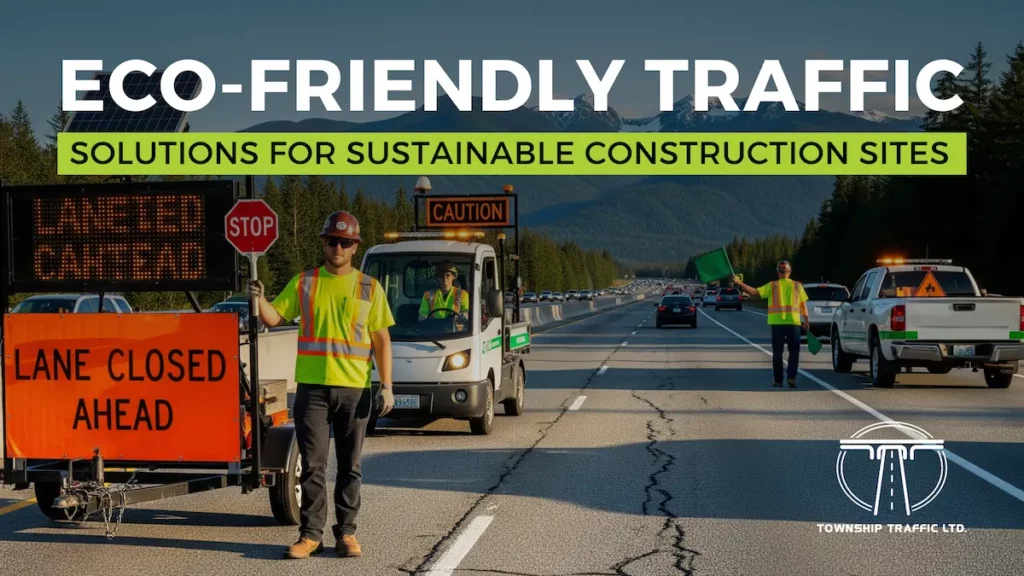In the face of growing environmental concerns and stricter sustainability regulations, the construction industry is under pressure to reduce its carbon footprint. One often-overlooked area ripe for innovation is traffic control, a vital component of construction site operations. Adopting eco-friendly traffic control solutions is not only good for the planet but also essential for maintaining efficiency, safety, and compliance.
In BC, where infrastructure development is booming, companies like Township Traffic are leading the way in offering sustainable traffic management services tailored to the unique needs of local construction projects.
Why Sustainable Traffic Control Matters
Traffic control at construction sites involves managing the safe and efficient movement of vehicles, pedestrians, and construction equipment. While its primary purpose is safety, traditional traffic control systems often rely on outdated, energy-intensive methods and disposable materials.
Here’s why greener solutions are becoming essential:
- Environmental regulations in BC are pushing construction companies to reduce emissions and waste.
- Municipalities like Surrey, Langley, Abbotsford, and Chilliwack are adopting climate action plans that emphasize sustainable construction practices.
- Clients and stakeholders increasingly expect eco-conscious practices on job sites.
As more infrastructure projects in BC ramp up, integrating environmentally responsible traffic control methods helps future-proof your business.
Key Eco-Friendly Traffic Control Practices
Let’s take a closer look at how construction projects across British Columbia can adopt sustainable traffic control solutions.
1. Solar-Powered Traffic Signals and Lighting
One of the most effective ways to reduce the carbon footprint of traffic management is to use solar-powered traffic lights and work zone lighting. These systems operate independently of the power grid and use renewable energy, making them ideal for remote or long-term projects.
In BC’s rapidly expanding suburban zones, such as Mission and Maple Ridge, where access to electricity may be limited, solar lighting can provide reliable, eco-conscious illumination.
2. Reusable Signage and Materials
Traditional traffic signs and cones often end up in landfills after a single use. However, many companies are switching to durable, reusable traffic signage made from recycled or sustainable materials.
At Township Traffic, sustainability is a core part of their service offering. Their use of high-quality, long-lasting traffic signs ensures multiple deployments without compromising safety or compliance, saving both resources and money in the long run.
3. Low-Emission Fleet and Equipment
Traffic control vehicles, such as pilot cars, message board trailers, and equipment trucks, can be major contributors to site emissions. Transitioning to low-emission or hybrid traffic control vehicles significantly reduces a project’s environmental impact.
Some companies in BC are now investing in electric fleet upgrades and encouraging idle-reduction policies on worksites to curb unnecessary fuel usage.
4. Smart Traffic Management Technology
Eco-friendly solutions also include smart traffic control systems, such as automated flagging devices and real-time traffic flow sensors. These technologies reduce the need for manual labor in high-risk areas, minimize congestion, and optimize detours, thereby cutting down on idling and emissions from vehicles.
For busy corridors like Highway 1 through Abbotsford and Chilliwack, smart solutions help maintain traffic flow while keeping construction areas safe and green.
5. Efficient Scheduling and Routing
Reducing unnecessary trips to and from a construction site can drastically cut emissions. Eco-conscious traffic control companies like Township Traffic work closely with construction managers to create efficient detour plans and traffic flow schedules that minimize disruption and vehicle emissions.
This is especially valuable in densely populated areas like Burnaby or Coquitlam, where construction delays can lead to extended vehicle idling and increased air pollution.
Township Traffic: Leading the Way in Green Traffic Management
Based in British Columbia, Township Traffic has built a reputation as one of the province’s most reliable traffic control service providers. What sets them apart is their commitment to safe, professional, and sustainable practices.
Here’s how Township Traffic supports eco-friendly construction projects:
- Utilization of solar-powered message boards and lighting systems
- Adoption of durable, reusable signs and sustainable materials
- Ongoing training for Traffic Control Persons (TCPs) in low-impact practices
- Modern fleet with reduced emissions
- Collaborative planning to reduce site congestion and emissions
Whether you’re managing a road-widening project in Langley or a utility upgrade in Surrey, Township Traffic provides tailor-made solutions that meet both regulatory requirements and sustainability goals.
Benefits of Eco-Friendly Traffic Control
Choosing sustainable traffic management practices isn’t just about being environmentally conscious—it delivers practical benefits too.
- Cost Savings: Reusable materials and reduced fuel consumption can lead to significant savings over time.
- Improved Reputation: Clients and communities appreciate contractors that prioritize sustainability.
- Regulatory Compliance: Eco-friendly practices help meet provincial and municipal environmental guidelines.
- Safer Work Environments: Smart systems and proper planning enhance on-site safety while reducing unnecessary exposure to hazards.
Final Thoughts: Building Greener Roads with Smarter Traffic Control
As BC continues to invest in infrastructure and urban development, the demand for sustainable construction practices will only grow. Traffic control may seem like a small piece of the puzzle, but it plays a vital role in shaping a greener construction future.
By partnering with local experts like Township Traffic, developers and contractors can confidently navigate this transition, balancing efficiency, safety, and sustainability on every project.
So, whether you’re overseeing a residential development in Kelowna, a highway expansion in Hope, or a commercial upgrade in Richmond, it’s time to think beyond conventional traffic control and embrace eco-friendly, forward-thinking solutions.









